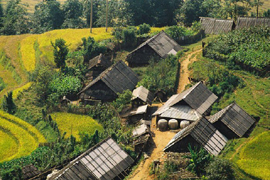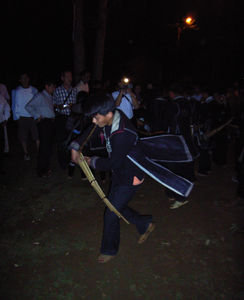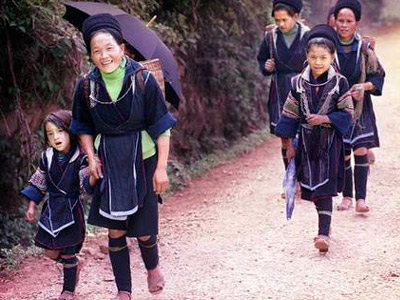 Sapa Vietnam - Located in North-West Vietnam , Sapa is the most attractive mountain place must be visited on any northern Vietnam itinerary. On a clear day you will treated to views of steeply terraced rice fields, towering verdant ridgelines, primitive mud-thatched villages, raging rivers and astounding waterfalls. Sapa Vietnam - Located in North-West Vietnam , Sapa is the most attractive mountain place must be visited on any northern Vietnam itinerary. On a clear day you will treated to views of steeply terraced rice fields, towering verdant ridgelines, primitive mud-thatched villages, raging rivers and astounding waterfalls.
Nestled high in the Tonkinese Alps near the Chinese border, Sape was built as a hill station during French colonial days, to serve as a respite from stifling Hanoi summers. These days, weekends are still the biggest draw in this crumbling hill-tribe center. Visitors from the capital flock to Sapa for a glimpse of the famed "Love Market," a trek to local hill tribe villages, or an ascent of Vietnam's highest peak, Fan Si Pan.
Some eight ethnic groups inhabit Lao Cai province: Hmong, Dao, White Thai, Giay, Tay, Muong, Hao and Xa Pho. The most prominent in town are the Red Dao, easily identified by the coin-dangling red headdresses and intricately embroidered waistcoats worn by the women, and the Hmong, distinguished by their somewhat less elaborately embroidered royal blue attire. Groups of ethnic Hmong youngsters and women can be seen hauling impossibly heavy, awkward baskets of wood, stakes, bamboo, bricks, mud and produce. Deep in the valleys surrounding Sapa, the Muong Hoa River sluices a wild, jagged course among Giay, Red Dao and White Thai settlements, their tiny dwellings poking out of the neon rice fields like diamonds on a putting green. One- to four-day treks are offered by a handful of outfitters. Guests sleep in tents or in the homes of villagers, their gear hauled by Hmong porters. Be warned: Despite what the local innkeepers will tell you, both the Hmong and the Dao really do not enjoy having their photographs taken unless they're paid for it. It's a certainty that any brochure you see of smiling, care-free ethnic hill people was shot under a Screen Actors Guild contract.
Sapa Love Market
 Sa pa is famed for its "Love Market" – sort of a cross between a peacock mating ritual, a Middle Eastern arms bazaar, an Amish square dance, a bad Pavarotti concert and Bangkok's Patpong (except here the people wear clothes). On Saturday nights, Red Dao hill tribe youths of both sexes congregate in a weekly courting rite, singing tribal versions of Loretta Lynn love songs to woo the opposite sex. The songs are highly personalized and boast of the composer's physical attributes, domestic abilities and strong work ethic. While Dao women are indeed highly industrious, the men, it seems, prefer to spend most of their time drinking, smoking opium or sleeping, only occasionally slapping the rump of a lethargic bovine moving more slowly than they are. Few of their songs, though, are about drinking, smoking opium, sleeping or slapping rumps Sa pa is famed for its "Love Market" – sort of a cross between a peacock mating ritual, a Middle Eastern arms bazaar, an Amish square dance, a bad Pavarotti concert and Bangkok's Patpong (except here the people wear clothes). On Saturday nights, Red Dao hill tribe youths of both sexes congregate in a weekly courting rite, singing tribal versions of Loretta Lynn love songs to woo the opposite sex. The songs are highly personalized and boast of the composer's physical attributes, domestic abilities and strong work ethic. While Dao women are indeed highly industrious, the men, it seems, prefer to spend most of their time drinking, smoking opium or sleeping, only occasionally slapping the rump of a lethargic bovine moving more slowly than they are. Few of their songs, though, are about drinking, smoking opium, sleeping or slapping rumps
Can Cau Market
Sprawling near the banks of a river, Can Cau Market is a clearly defined shantytown, packed with crude stalls covered with thatched roofs. The start of a few simple settlements can be seen high above, many of whose residents now make their weekly pilgrimage to the market. We are only 9kms from the Chinese border and some traders make the journey across from China on horseback. Unfortunately foreigners are not allowed to reciprocate this set-up, however tempting it may seem.
By 9 am, the market is crammed to capacity. It's lively and surprisingly fun. The locals are mostly of the Flower Hmong minority group. You can't miss them -their traditional costume of green checked headdress and multi-colored, meticiculosly stitched and layered garments are simply stunning. Few foreigners make it to Can Cau; those that do brave the journey come either with a small tour group in four-wheel drives, or - if half-mad and on a tight budget like me -on the back of a motorbike. The handful of Westerners here this morning are the object of intense - though friendly- scrutiny. There is much laughter as we try to make basic conversation. Although the majority are painfully shy and not accustomed to seeing foreigners, some cheerfully allow photographs to be taken.
 Can Cau is predominately a livestock market and not the sort of place to buy some choice gifts for the folks back home. Beyond the fenced-in perimeter, pot-bellied pigs, chickens and water buffalo wait patiently by the river to be sold. They rub shoulders with magnificent wild horses, some of whom will be transporting their masters back over to China. But the market also sells the basics: traditional clothing, sacks of rice, bundles of coarse, raw wool and ironware. Some stalls sell fresh tobacco and a rather sad array of root vegetables. Many women sell their wares from large, wicker baskets and sit weaving whilst waiting for a sale. I note that there are many giant plastic containers lying around with attached tubes. I mistakenly think this is gasoline, but it is in fact the omni-present rice wine and some folk are spotted wisely filling up their water bottles for the long ride home. Food stalls serve bowls of steaming fat noodles in broth and indescribable plates of what I can only assume are some sort of animal innards. It is almost like being transported back in time. There are few traces of the outside world, save the occasional soccer tee-shirt cast off and digital watch. As I observe the incredible costumes, deep shyness and the dark, weather-beaten skins, it is hard to imagine that this is the same country as freewheeling Saigon City in the south. It might as well have been on another planet. Can Cau is predominately a livestock market and not the sort of place to buy some choice gifts for the folks back home. Beyond the fenced-in perimeter, pot-bellied pigs, chickens and water buffalo wait patiently by the river to be sold. They rub shoulders with magnificent wild horses, some of whom will be transporting their masters back over to China. But the market also sells the basics: traditional clothing, sacks of rice, bundles of coarse, raw wool and ironware. Some stalls sell fresh tobacco and a rather sad array of root vegetables. Many women sell their wares from large, wicker baskets and sit weaving whilst waiting for a sale. I note that there are many giant plastic containers lying around with attached tubes. I mistakenly think this is gasoline, but it is in fact the omni-present rice wine and some folk are spotted wisely filling up their water bottles for the long ride home. Food stalls serve bowls of steaming fat noodles in broth and indescribable plates of what I can only assume are some sort of animal innards. It is almost like being transported back in time. There are few traces of the outside world, save the occasional soccer tee-shirt cast off and digital watch. As I observe the incredible costumes, deep shyness and the dark, weather-beaten skins, it is hard to imagine that this is the same country as freewheeling Saigon City in the south. It might as well have been on another planet.
Binh Lu & Tam Duong Market - Sunday
Every Sunday from 8 am to 1 pm.
Binh Lu and Tam Duong market is located on the other side of Sapa, passing the 1900 meter Tram Ton pass, Viet Nam's highest mountain pass and considered the most beautiful stretch of road in the country. The town is bustling with activity as the local hill tribes gather for their weekly market day, amazing tribal markets in Binh Lu where thousand of Thai Kadai language groups such as Tai Lu, Tai Laos, White Tai, and H'mong - Yao group (black Yao, Yao Lantien..), Giay, Khomu.. comes to buy and sell their own produces.
Coc Ly Market - Tuesday
From 7 am to lunchtime
Off the beaten track. Several groups of Mong, Dao, Tay, Nung and Phu La groups can be found in this secluded mountain market. Return back by boat down the river Chay and marvel at the untouched natural beauty of the region
Muong Hum Market - Sunday
Every Sunday from 6 am to 1 pm.
This market is the biggest cardamom market in the region, pre-dating the French and serves as a meeting point for the ethnic groups living in the mountains; including the Giay, Dao, White H’mong and Ha Nhi. Those who live in the upper reaches of the mountains such as the Mong or Red Dao come down to sell specific products such as cardamom and mountain plants. In Muong Hum, it's worth taking a sip of the local brew - here it's paddy rice brandy from the Dao village of San Lung. It's become quite a famous tipple.
Muong Khuong - Sunday
Every Sunday from 6 am to 1 pm.
Big market with a variety of ethnic groups, Mong, Dao, Nung and others, including visitors from as far away as China come to sell their products. Pa Zi women can be found selling traditional incense made from bark and resin of scented trees. |

